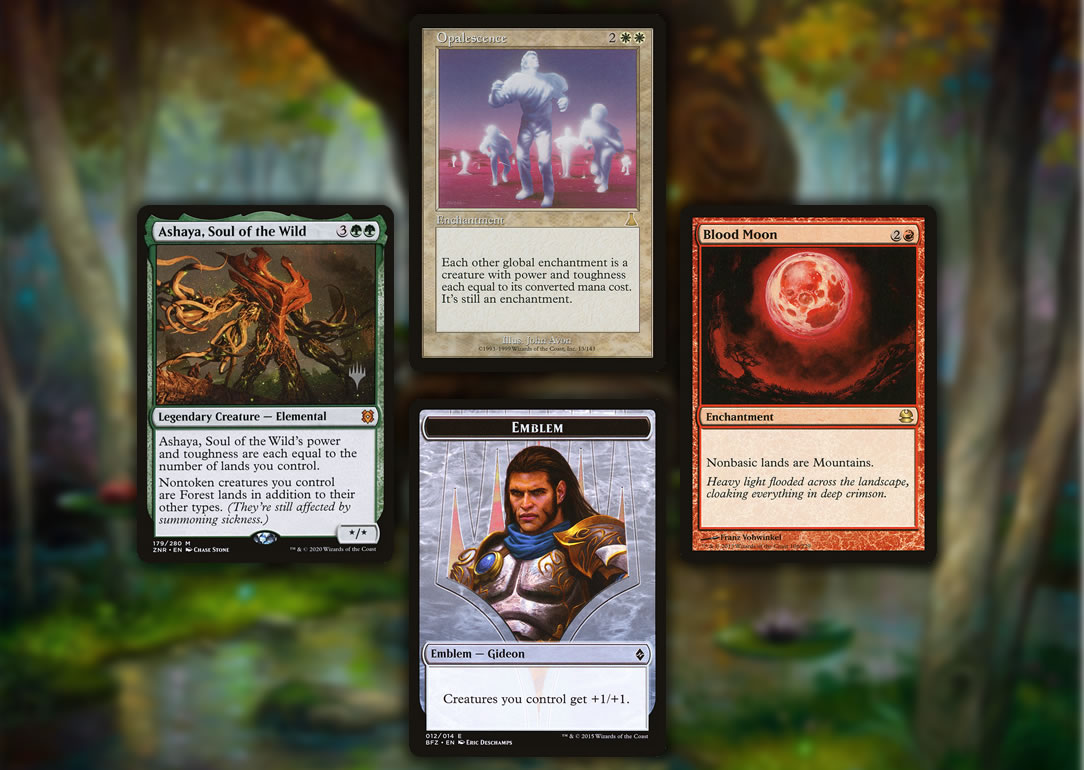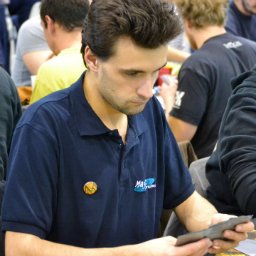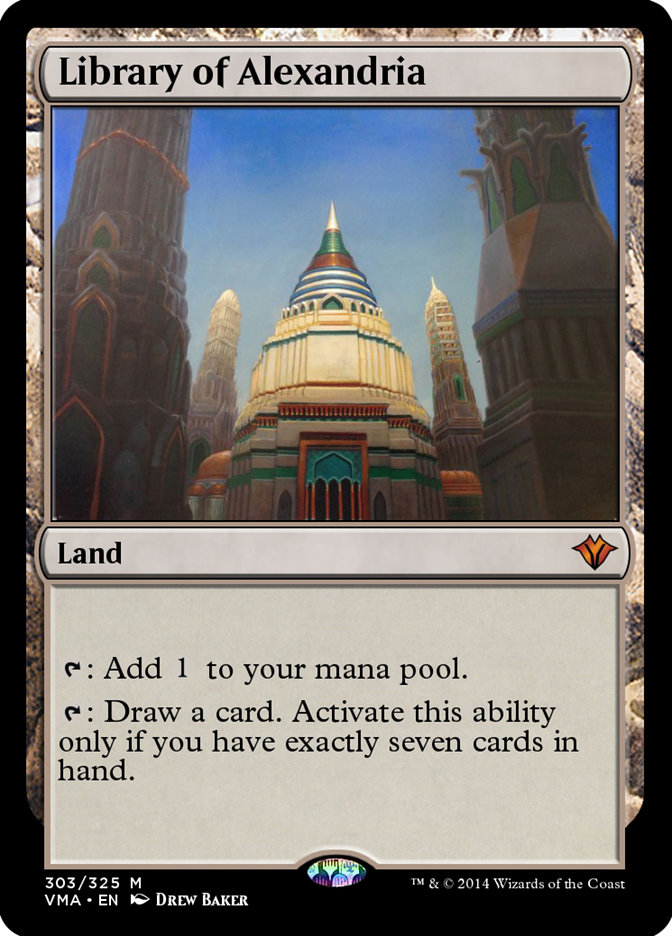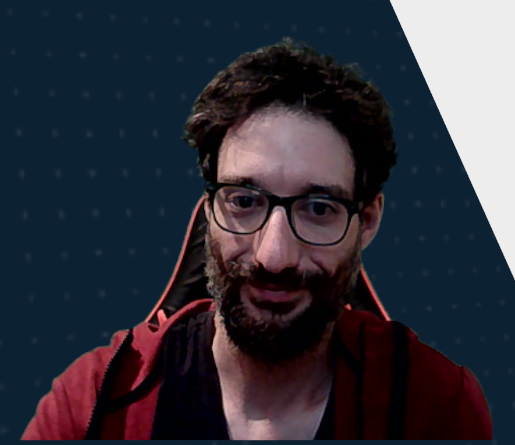Level Up Your Game: Solving the Right Puzzles
Intro: What is Magic About?
Back in 2019, Magic: the Gathering was established as the world’s most complex real-world game by the MIT Technology Review . If you’ve played the game for about any amount of time, that statement probably did not surprise you. At a beginner level, the rules alone are the stuff of nightmares. Now that I think of it, that remains true at a professional level as well.
We recently had the case where Opalescence, Ashaya, Soul of the Wild, Blood Moon and a Gideon, Ally of Zendikar Emblem were in play at the same time, and while we were all experienced players, we did need one of the best judges in our country to clarify it all. If you know the answer to this puzzle, feel free to show off and explain your solution in the comments.

The Harder Puzzles Are Found in Game
In the end, puzzles are what Magic is about. But rules puzzles are probably the easiest ones to solve. A simple, albeit massive, algorithm with “ifs” and “ors” could probably solve any rules query. If you knew all the rules, you probably would have little difficulty untying the hardest of rules knots. The harder puzzles are found in game, where the steps you take are not predetermined and you have to make decisions. Some time ago, ChannelFireball shared such puzzles as “Can you win this turn?” on a regular basis.
Here is an example:

The hard ones required some advanced rules knowledge to reach victory, but most simply encouraged thinking outside the box and making some counter-intuitive decisions, like removing your own creatures or targeting yourself with damaging spells to win the game. In this one for example, tap the two Hierarchs to cast Blessed Alliance to give 4 life to your opponent, which kills all Death’s Shadows with your opponent at 14 life, then tap your lands for Reality Smasher and swing for 14 with the team.
Pretty easy right?
Whether you like resolving these puzzles or not, you probably tried your hand at least once or twice. Out of principle perhaps? As we said, Magic is about puzzles, it’s never a bad idea to practice every now and then.
But there is still something missing, isn’t there?
What’s the Play?
You are great at solving puzzles. You enjoy it, and you are great at it, you fold those “What’s the play?” in 2 minutes flat every time. And yet somehow, you cannot seem to get past that FNM-winner stage. Maybe you won an RCQ, maybe you even got your invite to the Pro Tour, but you are probably not expected or expecting to win that one. I’m not taking a lot of chances when saying that, there are a lot of excellent puzzle solvers out there that cannot make it to the great stage, courtesy of few available spots.
So what’s all this about?
Like an amateur footballer who juggles better than Ronaldinho but never had the opportunity to go pro, you might have accepted that Magic is not just about solving these puzzles, and that there are other skills you need to improve. There is some truth to this, because as you have noticed, all these nice little puzzles are very unlikely to actually happen in real games. But I would argue, the issue lies here still. Magic is about puzzles.
Maybe the word “puzzle” is misleading. A normal “puzzle”, as you picture it, is a game with a lot of pieces that nicely fit together to get a beautiful picture. The puzzle has a solution, a correct answer. Rules queries and “Can you win this turn?” all have an engineered correct solution as well, it’s just a question of figuring it out. But as we said earlier, Magic is more complex than that. Imagine an actual puzzle, but one representing abstract art you have never seen before, and you pick each piece one at a time from a bag containing an unknown number of pieces, not all of which are necessary to finish the puzzle. Now you have a closer idea of the kind of puzzles Magic really is. A puzzle is just a series of decisions you must make to optimize your output through uncertain circumstances. A Magic puzzle does not necessarily have a sure, final or unique solution.
Understanding this changes our approach to puzzle solving. It means every play now fits the definition of a puzzle. That is no accident, every play has the potential to butterfly-effect you into very different directions.
A few examples
Let’s see a few examples about what we just discussed.
Example 1: Nathan Steuer VS Eli Kassis
Take this one for example, imagine you are Nathan Steuer (nice, right?), upper half of the screen, this is Main Phase 1:

What’s the play?
Such a simple question, one we have been asking from the very beginning. But this time, it’s tricky, because there is no win in sight.
I am reasonably sure that an easy 95% of players would have gone Liliana then -2, Raffine being such a threat. The kind of play you wouldn’t really think about: there’s an important threat, you have the ideal removal, most people would just go through the motions. But this play means that Steuer would open up to a Sheoldred on the next turn, a far more terrible threat on this board than Raffine, and after taking a long while to consider the options, decides to go with Bloodtithe Harvester and sacrifice the other Harvester to kill Raffine, rather than playing Liliana. A decision that is far from intuitive, but probably the correct one nonetheless, and one that completely changed the dynamics of the game compared to a Liliana play.
Steuer did spot a puzzle that they had not
Steuer did not know that Kassis did have the Sheoldred in hand, but the long pause there, that baffled the commentators, is proof that Steuer did spot a puzzle that they had not, and it paid off. Here’s the link to the video , it’s great Magic being played, you should watch it if only for entertainment.
Example 2: Before the early game
In this one, we had the early stages of the game, where just going through the motions, even this early, can be suboptimal without you noticing it. But it can even go beyond that. In fact, I’ll raise you one further.

You might think it’s obvious, take the play. But what if you are playing Phoenix, facing RB Midrange in Pioneer? What if you are playing Cube with a Library of Alexandria and a Reanimator plan in your deck? What if you also have a Gemstone Mine in there? This might be the most impactful decision you have not spent a lot of time thinking about.
There is also a discussion to be had about deck selection as a decision and puzzle to solve, but let’s leave it there for the time being. There will be time to discuss this in a future article.
Every new information added to the game requires a pause for reflection. Some are short, some are hard, most are sneaky. Magic is about puzzles, yes. But it’s not about solving them, it’s about seeing them. Every play is a puzzle and every one can have severe consequences on your game, and we gloss over most of them. This is where you can get your edge.
Going Deeper: Change Your Habits
The Elf-Spotting Degree
In the far away land of Iceland (or right at home, if you live there), there is an Elf School that delivers an authentic Elf-Spotting Degree. Considering Elves don’t exist in real life, if you can spot them, you can probably spot hidden puzzles during a game of Magic. But how?
The most important part is building the habit. Like all habits, it first requires a conscient and rigorous effort. Take the time in game, but I found most effective is to go back on your games to figure out where you could have taken a different option. “It ain’t what you don’t know that gets you in trouble. It’s what you know for sure that just ain’t so” (attributed to Mark Twain).
Let us not minimize how hard this can be. Going back on your paper games from memory alone presents its own challenge, but even if you are fortunate enough to have a replay of your game, like on MTGO, it can be difficult. Psychologically, you need to get into a mindset that is close to the one you had during the game, so as to understand why you took every decision, but also taking a small step back to analyze every other possible decision. Even, or rather particularly, those you would dismiss instinctively. This is very hard, by essence, since most are subconsciously set aside, meaning if you missed them the first time, you might not spot them the second time either. It is a subtle equilibrium to find, and a hard one to maintain.
Asking the Right Questions
A useful tool is to get yourself a list of questions to ask, and ask them on every play of the game. Can I play this card? If so, what are all the potential targets? What are all the possible attack configurations? What are all the cards my opponent could be representing with this mana available? This might seem intimidating, as it could take a lot of time and could prove impractical in actual games. But there are a few factors to consider: it actually takes less time than you would think since in practice, a lot of options are actually rubbish. It’ll get easier and quicker with time too, and it will not affect your thinking time on the puzzles you already spot. And finally, slow play does not affect you when reviewing your own games, a fact you should take advantage of by spending potential hours on a single match discussing it with friends and team-mates. As Guillaume Wafo-Tapa would say, unless you have taken your first slow play warning, you are playing too quickly.
Unless you have taken your first slow play warning, you are playing too quickly
Learning is a process, and everyone has their own. If I could simply hand out the keys to the castle and let you bask in glory, I would. Unfortunately, you have to put in the efforts, and I can only offer some advice and methods as to how to proceed. But now that you know where you are headed, I am sure you will find your way.
Parting Words
There is little point in spotting puzzles if you can’t solve them, and you should still keep those skills sharp. But the truth is that there is even less of a point in solving puzzles if you can’t spot them. It is better to take the wrong decision in a situation you identified as a puzzle than to take the wrong decision without even thinking about it.
It is a hard task that requires time, concentration and dedication in order to get the habit right. And even then, you might not be done, since now you spot puzzles you have to learn how to make the best decisions out of incomplete information, a truly unsolvable aspect of the game. In spite of all that, I rest easy saying that if you can endure this paradigm shift and acquire the habit of taking the time to spot puzzles, your gaming level will skyrocket.
I hope this article has been of some help to you, and carried the importance of that one specific skill. I wish you the best in your quest to spot puzzles, and elves too if you’re into that.
If you liked this article maybe you will also find interesting on of the following ones What is Tempo?, How to Beat Tilt and Win More Games in Magic: The Gathering!, How To Get Ready for Your Next Magic: The Gathering Tournament, Know the Difference: Win Condition vs. Game Plan, The 4 Types of Advantage: Definition, Types & How to Calculate It.
Sign Up for MTGDecks newsletter
You'll receive a weekly email with more articles like this.
MTG Theory specialist
Moudou might not have many accomplishments to his name, but his numerous articles have helped many understand the basics of some of the most important theories in Magic. He now returns after a break to share some more timeless knowledge.










